A form of disruptive innovation occurs when a cultural shift is combined with utilitarian technology that allows the culture shift to scale. Blockchain and cryptocurrencies have both of these properties. They are a cultural shift manifesting through useful technology:
- We are in the midst of a global collapse of trust in institutions.
- Technologies (blockchain, digitally scarce coins, distributed consensus, etc.) allow us to operate without these trusted intermediaries are now emerging, and allow us to reimagine a world without these intermediaries.
In the midst of crypto-mania, we believe it important to focus on the utility behind the hype: Blockchain is software that allows us to reimagine trusted intermediaries. Cryptocurrencies are one of the first killer applications. Cryptocurrencies are reimagining the world’s most successful means to transmit trust: money.
Behavior Shift + Software = Step Function Change
When 1/ people to shift their behavior (often in ways that seem silly at first) in pursuit of utility and 2/technology enables these new behaviors at scale, dramatically improved solutions can emerge.
This combination is in pursuit of human needs and is ultimately a utilitarian behavior. For example, a decade before Uber, you could hail a random stranger on the streets of Moscow and negotiate a cash payment for them to drive you somewhere. Mobile phones and GPS enabled ride sharing at scale, but ride sharing also required people to shift their behavior and be comfortable getting in a stranger’s car. People did this because it was ultimately a step function improvement over calling a taxi. As both software and culture came together, a $100 billion+ industry emerged.
These evolutions are not easy in the short term as they may displace existing companies and may have unexpected second order effects. In the long term, however, innovations drive dramatic improvements in efficiency, productivity, and quality of life. Mobile phones disrupted PCs, which disrupted mainframes, which disrupted the slide rule. We should embrace disruptive innovation for its long term benefits while being mindful of its near term consequences.
Disruption is Faster and Larger Scale Than We Expect
When disruptive innovation rooted in a behavior shift occurs, it happens dramatically and the markets it creates are much larger than anyone expects. At the time it was raising a series A, many thought Uber could never be $1B dollar business if the entire taxi industry was only worth $10B. In retrospect, we have come to understand that lowering the friction to participation to anyone who owns a mobile phone dramatically increases the total addressable market. Once we got past the psychological hangups, we realized that shopping online let us access long tail items we never would have had access to otherwise, that watching strangers’ videos unlocked creativity we never knew existed, and staying at a stranger’s apartment may be a better experience than a hotel.
Cryptocurrencies May Be the Next Scaled Innovation
Blockchain and cryptocurrencies may be the next scaled disruption because they meet the critical criteria: 1/ There has been a dramatic collapse in our faith in the formerly trusted institutions of society, which indicates a willingness to consider alternatives to these formerly trusted institutions (a potential behavior shift) and 2/ New software enables trust-less transactions, trading off speed and throughput for security and censorship resistance.
1. Culture Shift: A Global Collapse of Trust
The following data from Pew, Gallup, and Edleman shows that many around the world have lost faith in the institutions that formed the foundation of modern society — the press, public schools, banks, etc. This is not a side effect of the Internet in the 90s or social media in the 2000s. Trust has been eroding since the 1960s in all of these institutions.
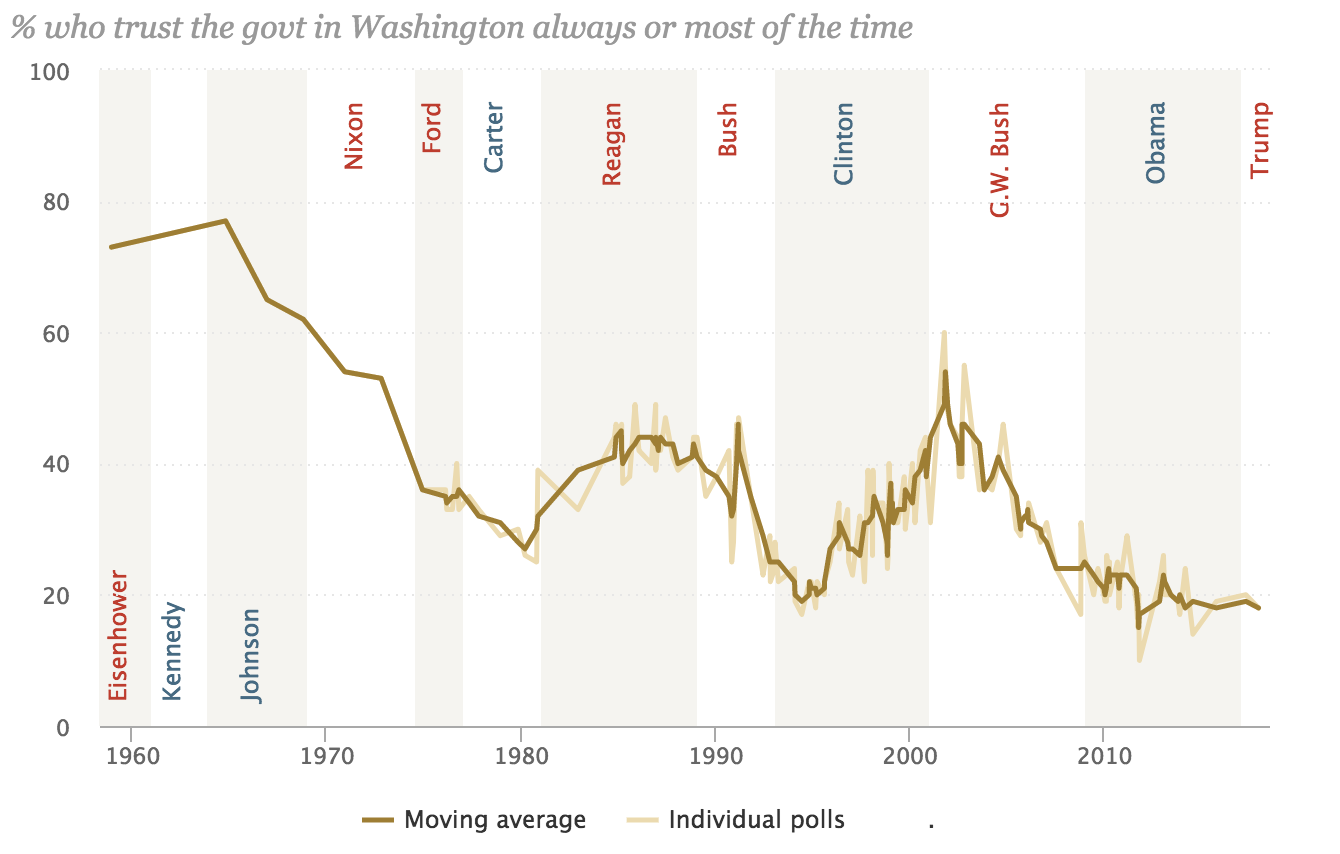
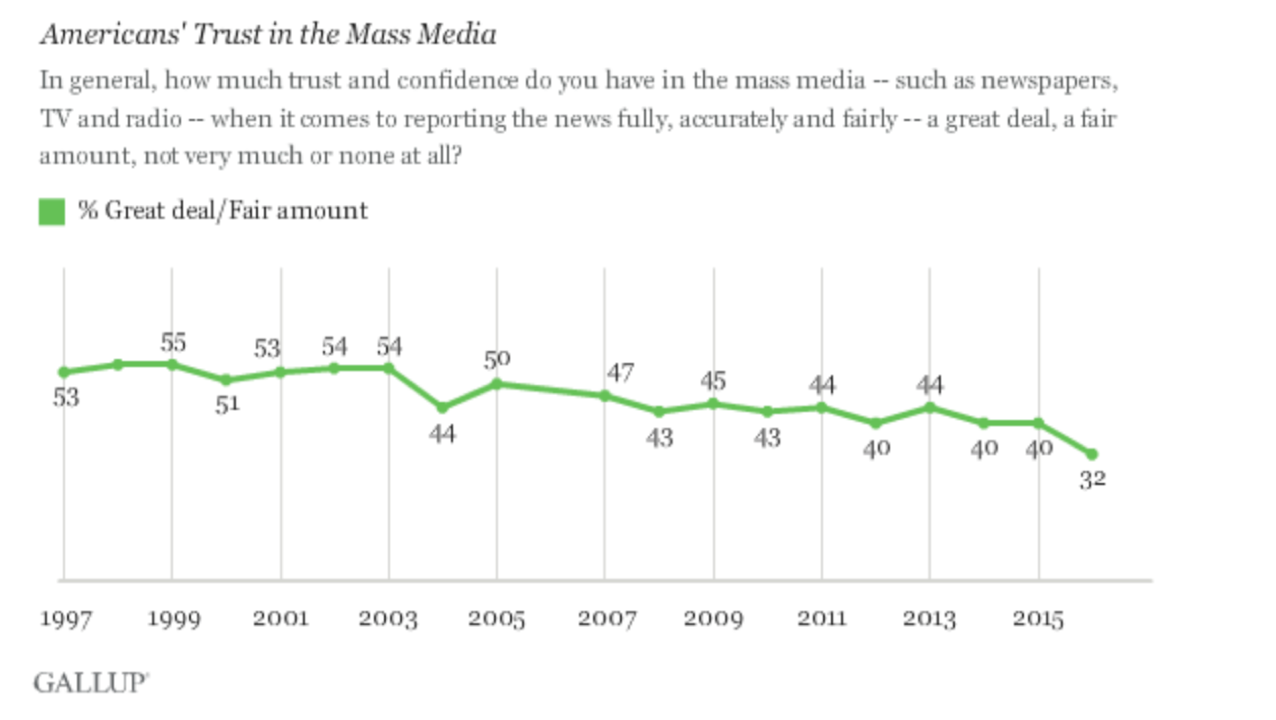
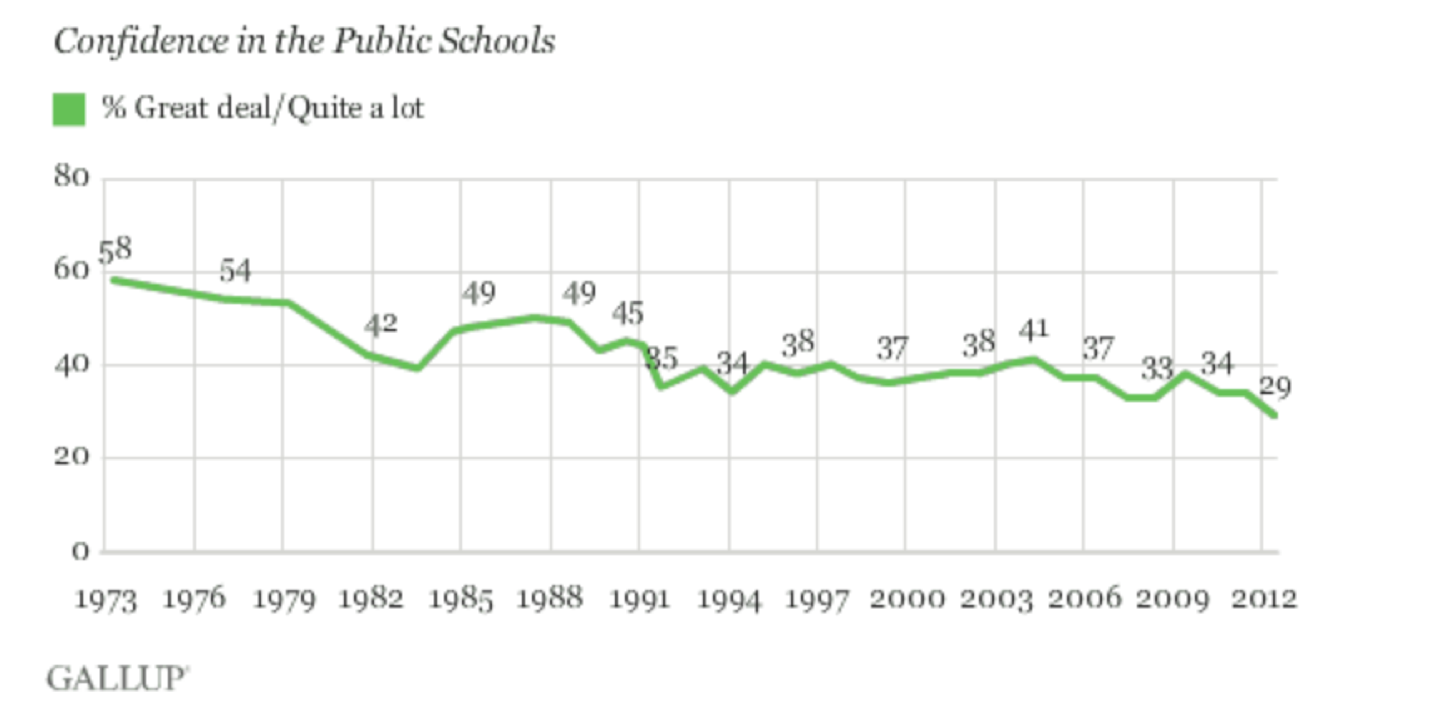
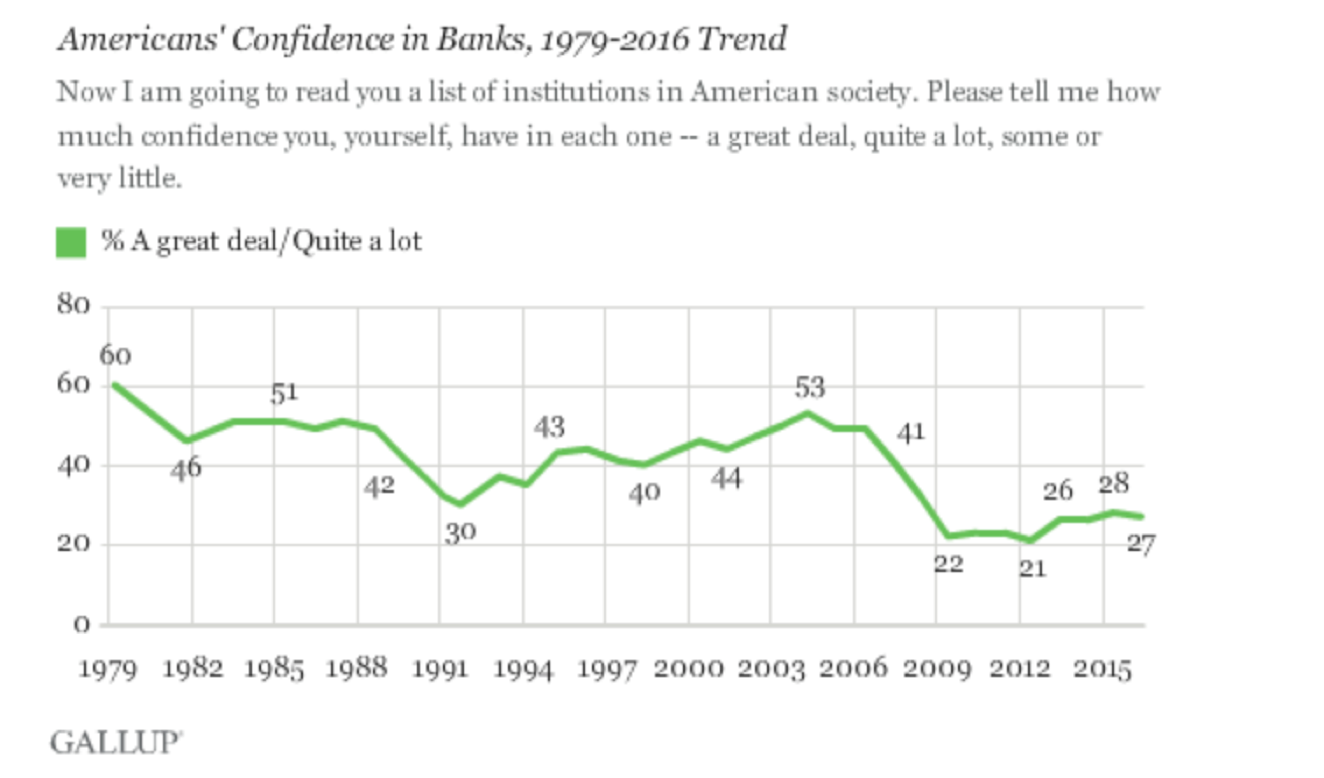
The collapse of trust is not an American phenomenon: it is a global shift and is particularly acute in Western Democracies where a significant majority of people believe the system is failing.

2. Blockchain = Technology to Operate Without Trust
Blockchain and related technologies are fundamentally about operating in an adversarial environment. Every aspect of constructing a permission-less blockchain system asks: What if we cannot trust an intermediary or counter-party? What happens if the participants in this ecosystem are malicious? How do we mitigate this? How do we design systems where an adversary cannot corrupt the integrity of the network?
For example, Bitcoin’s distributed+decentralized ledger eliminates single points of failure, its proof-of-work forces miners to have something at stake and secures the network from attackers, a history of all transactions required to construct the ledger (i.e. the blockchain) allows verifiability and enforces economically rational behavior between distrusting miners, and waiting six blocks (approximately one hour) helps minimize the chances of a Bitcoin being double spent. Even the code is distributed open source so that anyone can verify it.
Money is The World’s Largest Trust Market
Money is the world’s largest trust market; money and financial instruments are how we package and transmit trust at scale. Current forms of money and financial products rely primarily on a trusted intermediary; however after 2008 there was a dramatic collapse in trust in the institutions that make up the money stack from bottom to top.
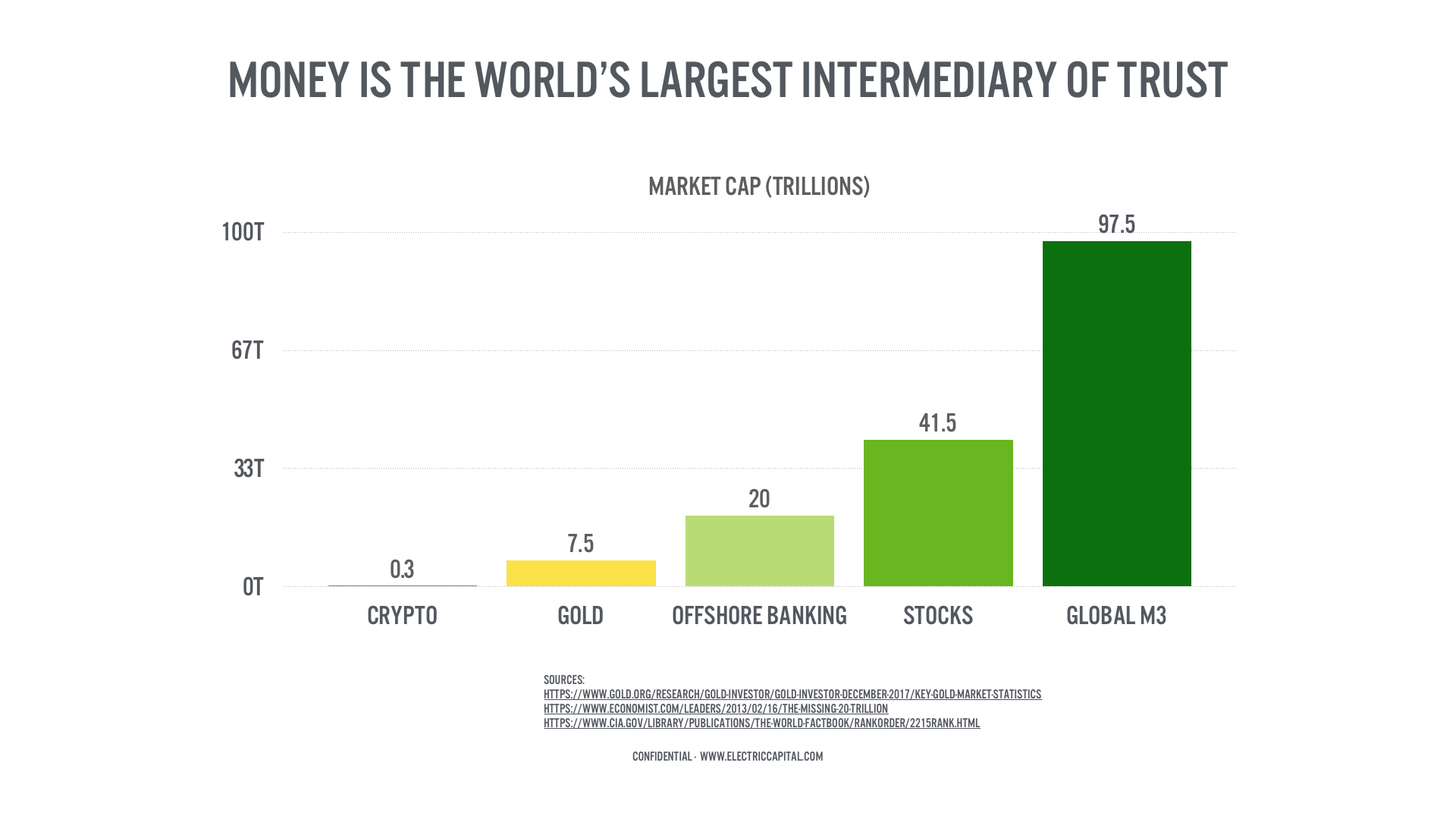

Cryptocurrencies are the killer app of blockchain technology because they are a tool to align trust between mutually distrusting parties. Cryptocurrencies allow us to reimagine how to conduct business in every part of the financial stack and thus what form an “intermediary” might take. Programmable Money may not result in a fully decentralized system but it certainly allows us to reimagine how we might construct each part of the financial stack using modern software tools.
Decentralization Comes At Tremendous Costs
Blockchain and cryptocurrency systems prioritize seizure-resistance, security, and immutability ahead of scalability and throughput. These are the opposite of the trade-offs centralized companies have made for the last one-hundred years.
The resulting decentralized system comes at tremendous costs (low transaction throughput) but in some use-cases the resulting benefits (intermediary free transactions, censorship resistance, seizure resistance, permissionless-ness, etc.) are worth the costs. Whether or not Bitcoin ultimately succeeds, the cryptocurrency market is fundamentally about asking where and when the costs of decentralization are worth the benefits.
When Do The Benefits of Decentralization Outweigh The Costs?
As silly as it may sound to invite a stranger to your home to give you a ride, the disruption occurs because the solution is rooted in utility. Disruption occurs because a solution is high return-on-investment. As a corollary, people are unlikely to change their behavior for incremental benefits or low ROI.
In some cases, such as a non-sovereign, monetary store of value, the benefits far outweigh the costs. The ROI of a permission-less, seizure resistant, non-sovereign store of value is tremendous. And it is fundamentally utilitarian — a cryptocurrency is dramatically easier to transfer, subdivide, and transport is a tremendous asset for most individuals in the world.
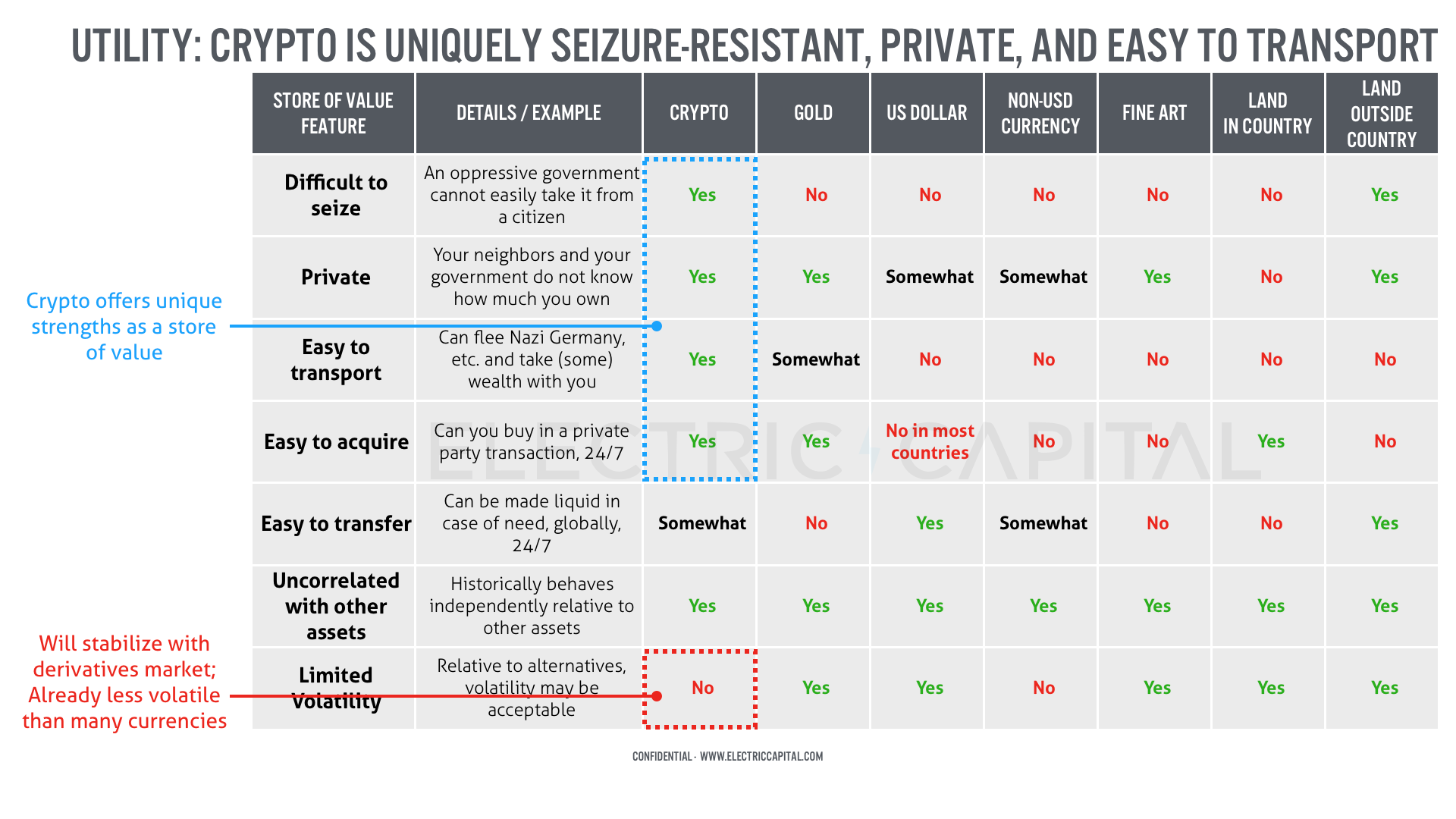
Through this lens, we may also consider when and where a smart contracting platform has high ROI. It is unlikely that most developers or users want to switch away from Amazon Web Services for a marginal improvement. It is far more likely that there are novel use for smart contracts wherein parties may not have a trusted intermediary and such transactions cannot happen today. For example, cross-border global trade where the jurisdiction to resolve dispute may be contentious or unknown, or contracts that must be executed reliably from beyond the grave (e.g. wills and trusts) are far higher ROI and thus far more likely starting points for smart contracts.
Reimagining Trust: Where Are We Now?
Step-function changes enabled by technology take root much more quickly than we might expect, and the rate of adoption is only accelerating. The iPhone is only ten years old but it is hard to imagine a world without smartphones.
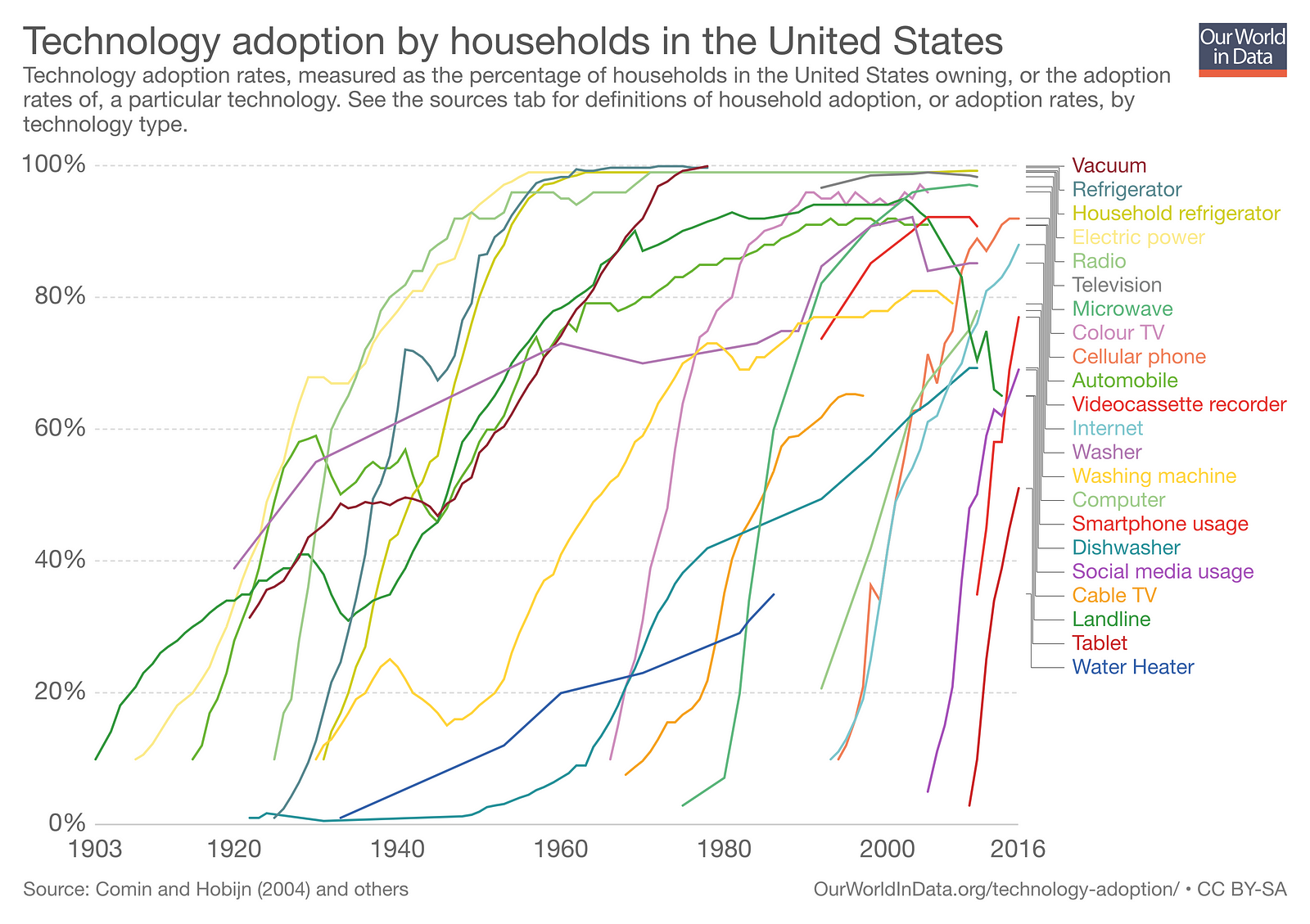

Cryptocurrencies are moving at an ever accelerating pace as well, in large part because the number of developers entering the space. But by all accounts we are in the early days of blockchain and cryptocurrency adoption. Many projects are just launching and have not yet scaled. Using Chris McCann’s approximation, baselined against early Internet adoption, we are in the equivalent of 1994 or 1995 in crypto right now.
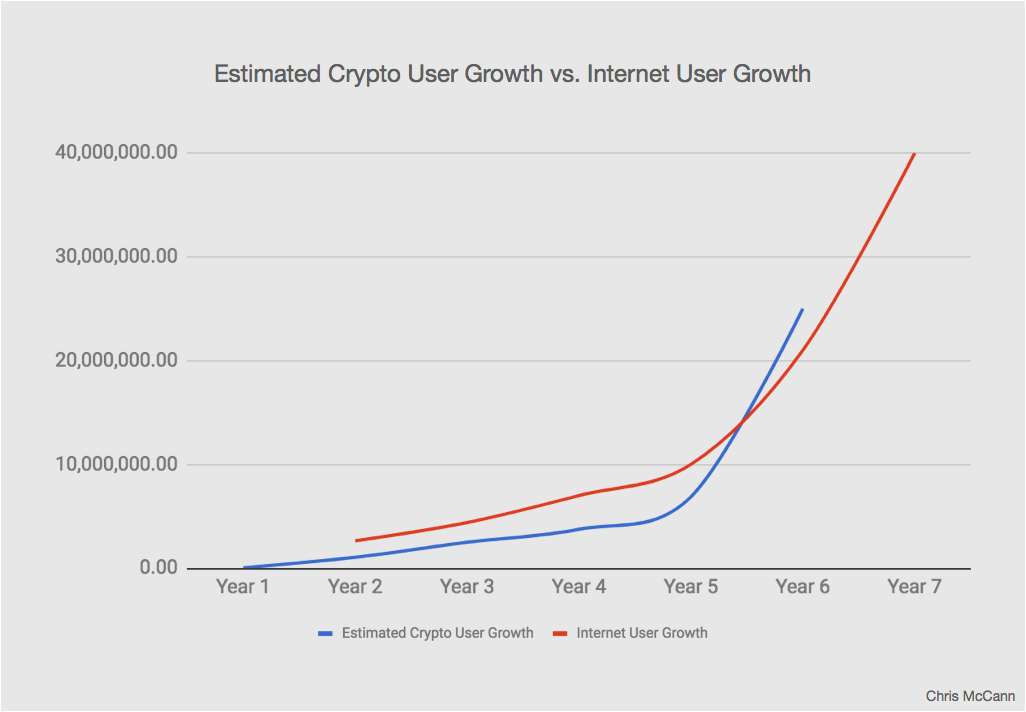
What would you do if you could go back to 1995?
If blockchain and cryptocurrency are indeed a global shift in how we think about trusted intermediaries, they may well be as transformative as the Internet. If we are currently in 1995, the natural questions to ask are “If I could go back to 1995, what would I do? What might I do differently?”
Though blockchain and cryptocurrencies will evolve differently than the Internet, we believe there are two takeaways that still apply:
- Focus on crypto-native opportunities — The most interesting products will address the global collapse in trust. These “crypto-native” products will only be possible using new technology and will not compete with established products. They will likely unlock new markets and solve for use cases that incumbents cannot compete with directly, though they may try. These crypto-native solutions will look like toys, will be niche products targeted at the wealthy to start, or will first take root in underserved markets (e.g. young people in developed countries or the middle class in developing countries) where people have no sunk cost in existing trusted intermediaries. However, as the Internet has taught us, if 50M people want something, odds are 1B people want it eventually.
- Be patient — we were trying to do video chatting, online to offline communities, and social networks from the early 90s. The infrastructure was too nascent and the demand was not yet present. Many crypto-native opportunities will be the same way.
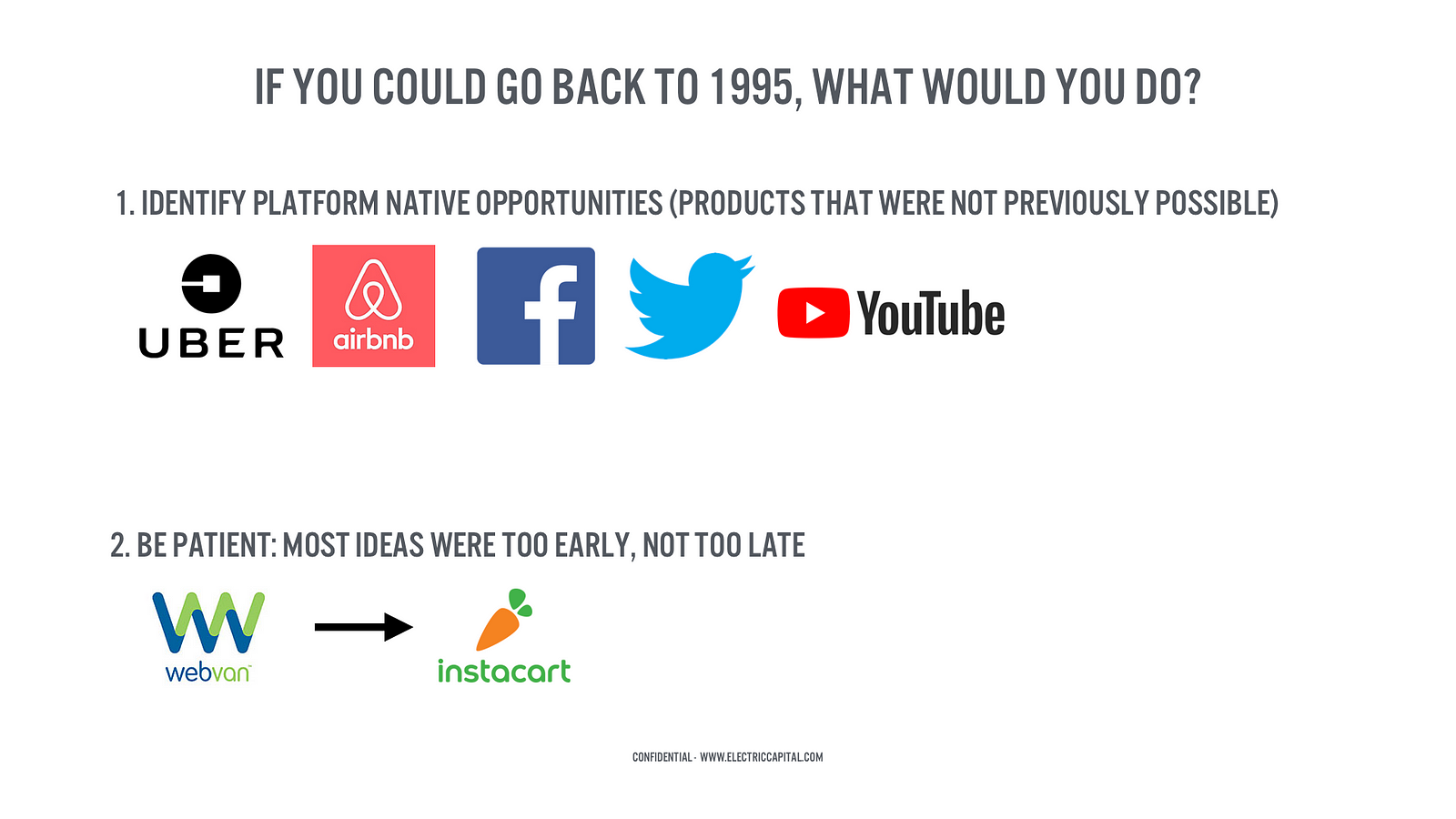
Developers are reimagining trusted intermediaries
There has been a long, slow collapse in trust in the intermediaries that served as the pillars of post-WWII society. This has been a consistent trend across institutions since the 1960s, though it is only in the last decade that many have become acutely aware of this shift.
Now that we have the technologies to perform the functions of some of these institutions, thousands of developers are reimagining these institutions to be more transparent and accountable.
How long it will take for this to play out is unclear. What forms these technologies will ultimately take is unclear. Where these products will first find traction is unclear. What is clear, however, is that when tens of thousands of engineers start to build, betting against them is a losing proposition.




John Keats
On First Looking into Chapman’s Homer
Much have I travell’d in the realms of gold,
And many goodly states and kingdoms seen;
Round many western islands have I been
Which bards in fealty to Apollo hold.
Oft of one wide expanse had I been told
That deep-brow’d Homer ruled as his demesne;
Yet did I never breathe its pure serene
Till I heard Chapman speak out loud and bold:
Then felt I like some watcher of the skies
When a new planet swims into his ken;
Or like stout Cortez when with eagle eyes
He star’d at the Pacific—and all his men
Look’d at each other with a wild surmise—
Silent, upon a peak in Darien.
https://dailycaller.com/2018/10/25/google-protected-exec-oral-sex/?utm_campaign=atdailycaller&utm_medium=Social&utm_source=Twitter